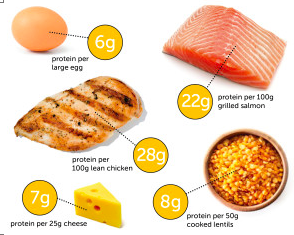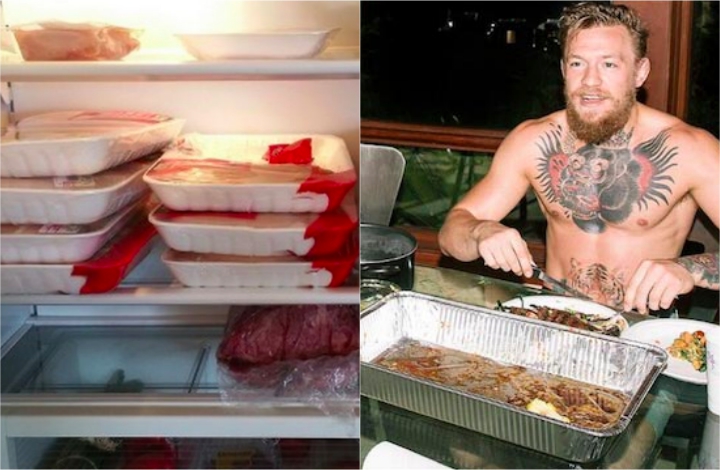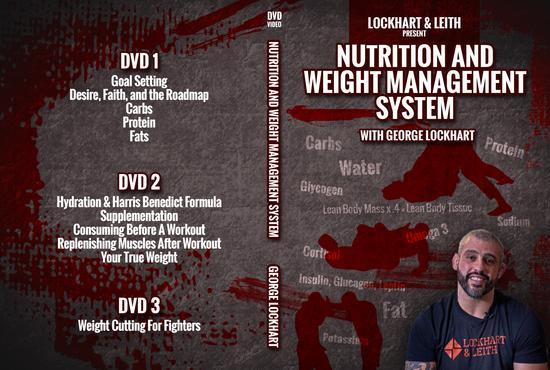Written by Reid Reale BHlthSc(Hons), MDiet – Sports Dietitian and BJJ black belt combatsportsnutrition.com. Reid works with many of the best judo, boxing, taekwondo and wrestling athletes in Australia, including commonwealth games and Olympic athletes. Reid Reale has released a great new book Combat Sports Nutrition, which covers what every grappler needs to know about sports nutrition, from how proteins carbs and fats affect your body to cutting weight properly.
Protein is perhaps the most sought after, highly valued yet misunderstood and overconsumed nutrient in a fighters’ diet. Amino acids are the building blocks of protein and when consumed in our diet are broken down during digestion, enter the blood stream and can eventually end up being incorporated into proteins within our body. Everybody thinks of protein as being crucial for muscle mass and recovery, however dietary amino acids eventually find their way into a variety of other tissues such as bones, cartilage, skin, blood, hormones and are important for hundreds of different metabolic processes taking place daily in the body.
Given the importance of this nutrient, surely the more protein the better, right? Well not exactly. Despite what the supplement companies want you to believe, there is an upper limit to the amount of protein one can utilise. Peer reviewed articles published in the scientific literature in recent years have shown us that dietary protein is more effectively incorporated into body proteins when it is spread throughout the day. In other words 100 grams of protein is best consumed in 5 x 20g servings (or 4 x 25g servings) spread throughout the day, rather than in 2 or 3 servings. This is because the maximal response which is triggered by 15-30g of protein (depending on your size) is not increased with higher doses. Therefore protein ingestion above the upper limit is simply used for energy and is thus nothing more than ‘extra calories’. Another factor which needs to be considered in regards to timing of protein intake is the ingestion around exercise. Studies have consistently shown that muscle protein synthesis (the construction of new protein) is most sensitive to the consumption of protein following exercise. Therefore fighters should makes sure to time one of their protein containing meals or snack within an hour following a training session.
In regards to total protein requirements fighters should aim for somewhere between 1.5 to 2g of protein per kilogram of body weight, spread throughout the day (aim for the upper end when attempting to build muscle mass or when dieting to prevent muscle mass loss).
 The type of protein consumed is also important. Proteins from animal sources (meat, fish, poultry, eggs dairy etc.) are more effective in promoting the rebuilding of body proteins than vegan sources of protein. This is because animal proteins container all of the required essential amino acids (those which cannot be produced in the body) and higher levels of the important amino acid leucine, which seems to be key in kick starting muscle protein synthesis. A fighter who chooses to not eat meat, poultry or fish should make sure to include eggs or dairy regularly in their diet as well as a variety of different plant sources of protein (ensuring a wide variety of essential amino acids from different plant foods). In terms of vegan diets the options are even less, so a fighter needs to carefully plan their diet to ensure an abundance of varied protein sources and should focus on tofu and soy milk particularly.
The type of protein consumed is also important. Proteins from animal sources (meat, fish, poultry, eggs dairy etc.) are more effective in promoting the rebuilding of body proteins than vegan sources of protein. This is because animal proteins container all of the required essential amino acids (those which cannot be produced in the body) and higher levels of the important amino acid leucine, which seems to be key in kick starting muscle protein synthesis. A fighter who chooses to not eat meat, poultry or fish should make sure to include eggs or dairy regularly in their diet as well as a variety of different plant sources of protein (ensuring a wide variety of essential amino acids from different plant foods). In terms of vegan diets the options are even less, so a fighter needs to carefully plan their diet to ensure an abundance of varied protein sources and should focus on tofu and soy milk particularly.
In terms of protein supplements, a fighter can definitely avoid them all together. By consuming lean animal and/or dairy proteins at regularly feedings throughout the day, protein timing, spread, and total requirements can easily be satisfied. Supplements however can be a convenient, portable and lean source of protein which can be taken to the gym to ensure intake is timed soon after training when it may be difficult to consume an appropriate meal. Lastly, don’t be fooled by marketing claims pushing you to buy the most expensive supplement. In reality, any whey protein isolate, whey protein concentrate or blend will provide near identical benefits. In fact skim milk powder is a suitable and cheap substitute for protein powders.
Take home messages:
- Protein timing and spread throughout the day is important along with total protein intake
- Aim for 1.5-2 grams of high quality protein per kilogram of body weight spread over 4-6 feedings throughout the day
- Animal/dairy sources of protein are high quality than vegetarian and vegan sources of protein
- Make sure to time your meals/snacks so that one of your protein feedings is consumed soon after finishing training (within 1 hour)
- Protein supplements are not necessary but can be useful in terms of convenience and portability
If you are not sure where to start and how to eat well, check out our newest and best-selling diet product from George Lockhart. Lockhart is one of the UFC’s leading nutritionist and has helped some of the best professional athletes in the world lose weight and doing it in a healthy fashion. Lockhart is the real deal and this product can literally change your life. It is an E-Book and a DVD. This is also available as a digital download below.


















